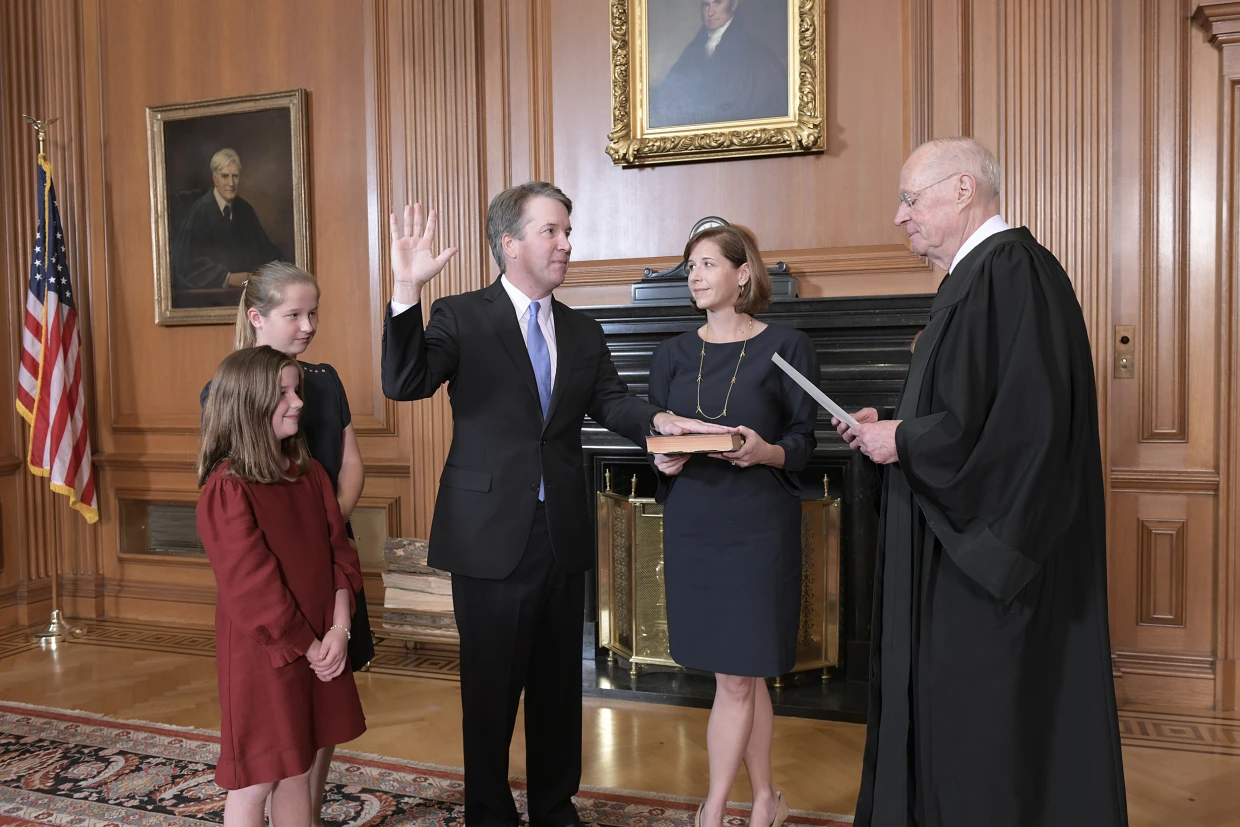In July 2018, President Donald Trump nominated Judge Brett Kavanaugh to the United States Supreme Court to replace retiring Justice Anthony Kennedy. Kavanaugh, a conservative federal appellate judge serving on the U.S. Court of Appeals for the District of Columbia Circuit, was viewed as a safe and experienced choice by Republican leaders. However, what followed his nomination would become one of the most explosive and divisive confirmation processes in U.S. history.
Kavanaugh had a long resume: he was a Yale graduate, had clerked for Justice Kennedy, and worked in the George W. Bush administration as a White House staff secretary. He had been serving as a judge for over a decade and had authored hundreds of judicial opinions. However, Democrats feared his nomination would cement a conservative majority on the Supreme Court for decades, potentially affecting decisions on abortion, healthcare, executive power, and more.
Partisan Tensions and Senate Strategy
Even before the allegations that would rock the confirmation hearings emerged, Kavanaugh’s nomination was already fraught with tension. The Senate Judiciary Committee, controlled by Republicans, planned for a swift confirmation. Democrats, still angry about the blockade of President Obama’s nominee Merrick Garland in 2016, pushed back hard.
Key concerns included:
- Kavanaugh’s record on presidential power, especially in the context of the ongoing Mueller investigation.
- His previous writings suggesting a sitting president should not be investigated or indicted.
- His stance on Roe v. Wade and reproductive rights.
- The lack of access to many of his documents from the Bush White House.
Despite these concerns, Kavanaugh’s confirmation process was moving forward—until a bombshell allegation changed everything.
Christine Blasey Ford’s Allegation
In September 2018, Dr. Christine Blasey Ford, a California-based professor and researcher, came forward publicly with an allegation that Brett Kavanaugh had sexually assaulted her in the early 1980s when they were both in high school.
According to Ford, Kavanaugh:
- Pinned her to a bed at a house party.
- Tried to remove her clothes.
- Covered her mouth to prevent her from screaming.
- Was laughing with his friend, Mark Judge, during the alleged assault.
Ford said she feared for her life during the incident. She had shared the story with her therapist years earlier and initially intended to remain anonymous. However, after the story leaked to the press, she agreed to testify publicly before the Senate Judiciary Committee.
Public Testimony and National Drama
On September 27, 2018, Christine Blasey Ford testified in a televised Senate hearing. Her calm, emotional, and detailed testimony captured national attention. She repeatedly stated that she was “100% certain” that Brett Kavanaugh was the person who assaulted her.
Later that day, Brett Kavanaugh testified in his own defense. His opening statement was fiery and emotional. He denied all allegations, claimed his reputation was being destroyed, and accused Democrats of orchestrating a political hit. His testimony included statements like:
- “This confirmation process has become a national disgrace.”
- “You have replaced advice and consent with search and destroy.”
The contrast between Ford’s composure and Kavanaugh’s anger polarized the nation. Some viewed his passion as a sign of innocence; others saw it as disqualifying for a Supreme Court justice.
Other Allegations and Controversies
As the process continued, additional allegations emerged:
- Deborah Ramirez, a Yale classmate, alleged that Kavanaugh exposed himself to her at a college party.
- Julie Swetnick, represented by attorney Michael Avenatti, alleged that Kavanaugh had participated in parties where women were drugged and assaulted.
Kavanaugh denied all the allegations. Republicans accused Democrats of trying to delay the nomination until after the midterms. The FBI was ordered to conduct a limited supplemental background check, but critics said it was rushed and incomplete.
The investigation lasted only a week and interviewed a handful of individuals, but not Dr. Ford or Judge Kavanaugh again.
Political Fallout and Public Opinion
The Kavanaugh hearings became a cultural flashpoint—reopening national debates around:
- Sexual assault.
- Women’s credibility.
- The treatment of survivors in legal and political systems.
The #MeToo movement, already in full force in 2018, was deeply tied to the confirmation battle. Thousands of protesters flooded Washington, D.C., and over 3,000 law professors signed a letter opposing Kavanaugh’s confirmation based on his temperament during the hearing.
Public opinion was divided. According to several polls conducted in late September and early October:
- A majority of Republicans supported Kavanaugh’s confirmation.
- A majority of Democrats and independents opposed it.
- Trust in the Senate and the confirmation process dropped significantly.
Impact on the Senate Vote
Despite the controversy, the Senate moved forward with the confirmation vote. Key swing senators became the focus of intense lobbying:
- Senator Jeff Flake (R-AZ) called for the FBI investigation but ultimately voted yes.
- Senator Susan Collins (R-ME) gave a 45-minute speech defending her decision to support Kavanaugh.
- Senator Joe Manchin (D-WV) was the only Democrat to vote in favor, citing his state’s conservative leanings.
On October 6, 2018, the Senate voted 50–48 to confirm Brett Kavanaugh as the 114th Justice of the United States Supreme Court.
The vote was one of the narrowest in modern history and marked the culmination of a brutal confirmation battle that left the Senate, and the country, deeply divided.






